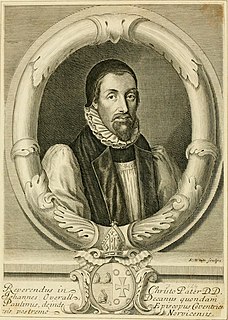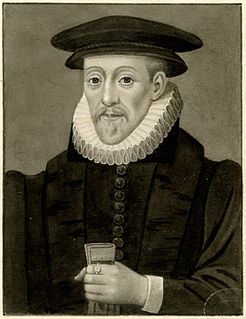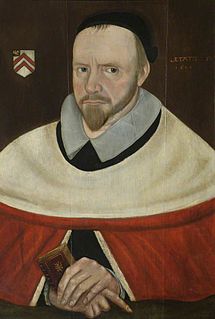Related Research Articles

Matthew Parker was an English bishop. He was the Archbishop of Canterbury in the Church of England from 1559 until his death in 1575. He was also an influential theologian and arguably the co-founder of a distinctive tradition of Anglican theological thought.

Corpus Christi College, is a constituent college of the University of Cambridge. From the late 14th century through to the early 19th century it was also commonly known as St Benet's College.

Roger Manners, 5th Earl of Rutland was the eldest surviving son of John Manners, 4th Earl of Rutland and his wife, Elizabeth nee Charleton. He travelled across Europe, took part in military campaigns led by the Earl of Essex, and was a participant of Essex's rebellion against Queen Elizabeth I. He was favoured by James I, and honoured by his contemporaries as a man of great intelligence and talent. He enjoyed the friendship of some of the most prominent writers and artists of the Elizabethan age and Jacobean age. In 1603 he led an Embassy to Denmark, homeland of James' Queen Anne of Denmark.

John Overall (1559–1619) was the 38th bishop of the see of Norwich from 1618 until his death one year later. He had previously served as Bishop of Coventry and Lichfield, as Dean of St Paul's Cathedral from 1601, as Master of Catharine Hall from 1598, and as Regius Professor of Divinity at Cambridge University from 1596. He also served on the Court of High Commission and as a Translator of the King James Version of the Bible.
John Clarke (1682–1757) was an English natural philosopher and Dean of Salisbury from 1728 to his death in 1757.
Richard Fletcher was a Church of England priest and bishop. He was successively Dean of Peterborough (1583–89), bishop of Bristol (1589–93), Bishop of Worcester (1593–95) and Bishop of London (1595–96).

Thomas Legge was an English playwright, prominently known for his play Richardus Tertius, which is considered to be the first history play written in England.

Thomas Green was an English academic and bishop.

John Jegon was an English academic and Bishop of Norwich. He supported uniformity of Anglican doctrine and worship, and strong government. This led him into conflict with John Robinson, later pastor to the Mayflower emigrants. On the other hand, he made efforts to satisfy local Puritans by the appointment of preachers in his diocese. Nicholas Bownd dedicated to him a work on doctrine of Sabbath.

Matthias Mawson (1683–1770) was an English churchman and academic, who served as Master of Corpus Christi College, Cambridge and then as Bishop of Llandaff, Bishop of Chichester, and Bishop of Ely.

Edward Henry Perowne was an English clergyman and college head, Master of Corpus Christi College, Cambridge.
Thomas Evans was a British poet.

Sir Francis Hynde, of Madingley, Cambridgeshire and Aldgate, London, was an English politician and landowner particularly associated with the development of Madingley Hall and its manorial estates.
Robert Harrison was an English lay schoolmaster who became a religious leader as a Protestant Separatist, one of the original Brownists.
John Pory (1502/03–1570) was an English churchman and academic, Master of Corpus Christi College, Cambridge.
John Copcot, DD was an English cleric and academic, becoming Vice-Chancellor of the University of Cambridge and Master of Corpus Christi College, Cambridge.

John Lamb, was an academic and Anglican priest in the first half of the nineteenth century: a mathematician he was Master of Corpus Christi College, Cambridge from 1822 to 1837; and Dean of Bristol from 1837 until his death.
William Middleton was an English churchman, academic and Protestant controversialist. He was Master of Corpus Christi College, Cambridge for a brief period in 1603.
Robert Norgate, D.D. was an English priest and academic in the second half of the sixteenth century.
Thomas Aldrich D.D. was a priest and academic in the sixteenth century.
References
- 1 2 3 "Jegon, Thomas (JGN580T)". A Cambridge Alumni Database. University of Cambridge.
- ↑ University of Cambridge web-site
- ↑ Horn, Joyce M. (1992), Fasti Ecclesiae Anglicanae 1541–1857, 7, pp. 44–46